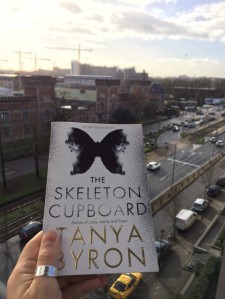
BOOKLUV RATING: 8 / 10
I’m lucky to share my life with a person that not only knows me well, but also puts a lot care in every gift she chooses. I got this book for my birthday so I had good reasons to believe I would enjoy reading it. However, after going through the first few pages, I started to worry: the descriptions of characters, their afflictions and diagnostic seemed to indicate the book was going to be made of pre-conceptions.
This said, after having read all the book, I’m happy to confirm that Tanya Byron’s The Skeleton Cupboard is very much worth reading.
So, what changed my mind? Well, one thing made the whole difference: the understanding that this book wasn’t as much about the patients as it was about the clinician, in particular, a clinician still in training. Under this light, the pre-conceptions displayed by Byron are justified: they are a reflection of the scientific method as applied by – and viewed from the eyes of – a clinical psychology student. Indeed, without the empirical experience there are greater chances that the formulation of the hypothesis is rushed and incorrect.
Throughout the book Byron gives an account of some of the clinical cases she went through during her placement; a placement that was marked by the tense relationship with her supervisor and Byron’s mood swings. The narrative blurs reality and fiction: the patients are not real, but the stories are inspired on real clinical cases. This combination was probably also one of the reasons the book seemed superficial when I first started reading it. Throughout my psychology training, I got used to reading factual accounts without the need for the story telling element. But The Skeleton Cupboard uses of a lot of story telling elements to give a impressionist view of what is to be a newcomer to the professional world of clinical psychology.
Luckly I managed to get rid of my own prejudices and pre-conceptions and, from there on, I enjoyed reading The Skeleton Cupboard… a lot! I’m not sure this is the best popular psychology book I’ve read, but for psychology students, recent graduates or someone wanting to remember their first years as a clinical psychology, it’s certainly worth reading.
There are several important implicit learnings out of the book: first of all, the path to becoming a psychologist is probably made of moments of love and hate. There will be times when you will be sure of your career decision and other times (hopefully not many!) where you will wish you had chosen something else. Second, you are bound to make mistakes, and even when you think you’ve been 100% analytical and the solution can only be the one now in your face, you will later realise that you jumped into conclusions. More importantly, if you are true to yourself, if you luv (more than like) psychology, The Skeleton Cupboard shows that at the end of the journey there is redemption and everything will make sense.
ABOUT THE AUTHOR:
Tanya Byron is a clinical psychologist and a professor of the Public Understanding of Science. She is also a writer and a public speaker, having reached popularity as a television show presenter and on-screen expert in the BBC series Little Angels (2003-05), Teen Angels (2005) and The House of Tiny Tearaways. (For a detailed biography please follow: http://www.professortanyabyron.com/biography/)
